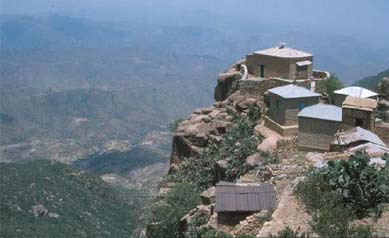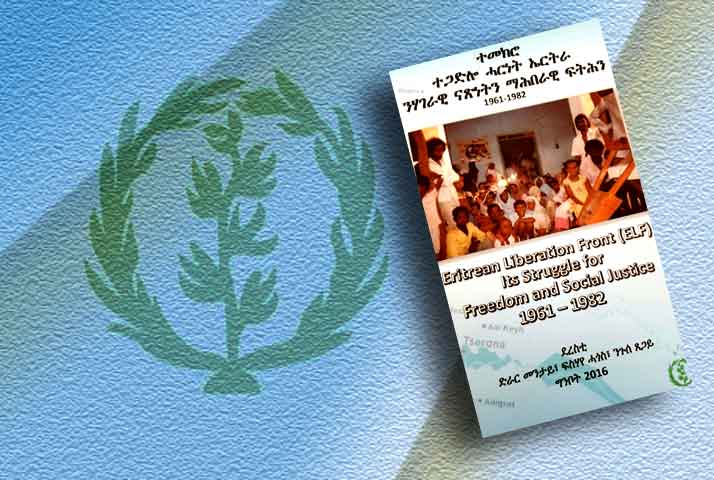Not A Whistle Through The Air
 “Where are the groups? You ask for it in your imagination. But you must tell me where these groups are.” The petty dictator of Eritrea rambling in an interview with a Swedish journalist.
“Where are the groups? You ask for it in your imagination. But you must tell me where these groups are.” The petty dictator of Eritrea rambling in an interview with a Swedish journalist.
If one examines the last 50-60 years history of Third-World nations, one is bound to see a glaring truth: the majority of their respective populace has lived under a political system where they hate their government and despise their so-called opposition. There are few notable nations that have shrugged off this stigma, but Eritrea is, unfortunately, the poster child of what is wrong with developing countries: short-lived independence euphoria followed by a long season of hopelessness and despair.
A lot has been written about the evil higdefite rule and the petty dictator at the helm of power; it is not my intention to recycle what many of us have said 8-9 years ago.
Many have pointed out—with some merit—that Isaias is digging his own grave; and that there is no need to murder a man who is committing suicide. This wait-and-see-approach is, however, neither a strategy for success nor a recipe for change. Unlike family law, national politics does not have inheritance rule that bequeaths power to next of kin. Even a dying regime like higdef could survive on life-support if there is no organized opposition that mobilizes people for an assertive action. The inability of the so-called opposition to fill this vacuum is the main reason why they are so despised by many.
The Eritrean opposition suffers from another ailment: fear. The chronic fragmentation and the constant squabbling within the opposition is an ominous reminder of what looms ahead. The future feels like a booby trap. If these groups that have every incentive in the world to unite—to pull their resources together against a common enemy and for a common interest—are failing to do so, how are they to instill confidence and inspire people to rise up against the regime?
The people are afraid – if the opposition comes to power – it will be the end of their country; Eritrea will disintegrate along ethnic, religious and regional lines. This is not a far-fetched scenario; what is happening to Somalia could happen to Eritrea. In their collective wisdom, the Eritrean people are reasoning that the devil they know is better than the one they don’t. The opposition is seen as the Four Horsemen of the Apocalypse.
Statistically speaking, most of the leaders in the opposition would not be around in the next 10-20 years, and from a purely rational perspective, they should put aside every difference they have in order to claim their rightful place in the history of the country they fought for—all their life. If these leaders could not recognize what is good for them, how are they expected to know what is good for the country! The burden of proof is upon the opposition and their respective leadership. The Eritrean people, like any other people on the planet, would judge a tree by the fruit it bears.
Sometimes, giving up is growing up and some of the leaders must either give up or grow up. No one is happy with the status quo.
As of now, there is no organization that has shown a purpose-driven struggle against the regime. It breaks my heart to say this, but the fact is there is no one single Eritrean organization that I can endorse and identify with. Like most people, I hate the regime and despise the do-nothing opposition.
Not all issues are created equal, and it is incumbent upon the opposition to prioritize. There are issues that should be tackled now and with urgency, and others later with much serious deliberations. This glaring absence of wisdom is very disheartening, but, what is even worse is the absence of action that defies tyranny – that instinctive response that says NO to it.
The regime is beyond redemption; but there is still chance for the opposition. The opposition could fight these two aliments of fear and despise. The former requires unity and the latter action. This calls for the convergence of all splinter groups into one or two consolidated organizations on the basis of fundamental principles and strategies.
It should be clear, by now, the convergence on the basis of what was duped “Minimum Agenda” does not inspire people or lead into meaningful unity. The “Minimum Agenda” is what short-changed them in the first place; it was wrong then and it is wrong now. Once you focus on big ideas and agendas; it is a lot easier to not sweat the small stuff.
There are three things that should be the launching pad for political realignment:
1) What is the nature of the regime? (Is it dictatorial? Is it sectarian? Etc.)
2) Means of changing the regime? (Armed struggle vs. peaceful struggle)
3) What will replace the regime? (Centralized vs. decentralized democracy, unitary vs. federal system… etc.)
Based on these three simple but fundamental questions, I can envision two viable organizations coming into play. One group would be represented by the Eritrean Democratic Alliance that recently held a National Convention for Democratic change, and the other group by the Eritrean Peoples Democratic Party. There will be some insignificant groups in between but they would not amount to anything. In our armed struggle history, there were two important organizations: the EPLF and the ELF and we need to build on that legacy. Our confidence in the future will primarily depend on how we reconcile our past. The first step towards reconciling the past is to claim it.
Having a two party system in Eritrea would produce a desirable political stability in the system. The EPDP could claim the EPLF and the EDA the ELF as their historical legacy. This is not to resurrect old wounds and squabbles but to give them a sense of continuity that would foster a strong future identity. EPLF and ELF are a state of mind, and should not be perceived merely as historical political entities. (I’m very aware of the small cross-over that have been made, but this fact does not negate the theme of my argument. For example, there is not much difference between the 1994 PFDJ political charter and the new EPDP’s.) Based on this mind-set, it is more true than false to classify these groups along EPLF and ELF lines, but, most of all; the future pay-off to the stability of the political system would be enormous. I think Eritrea is too small to accommodate many parties; the solution lies in having two major parties that would determine the fate of the nation. We can finally tango with two major political parties that are firmly rooted in the history of our nation. The anatomy of the forces that produced the ELF and the EPLF have changed in the past and they will change tomorrow; and in a tug of electoral wars, those changes would even be more meaningful and substantative.
If my reading of EPDP is fairly accurate, it believes: 1. That the PFDJ is a dictatorial regime; it is politics that is stupid. 2. The logic goes that for a political problem, there got to be a political solution, and thus, the call for a peaceful struggle, and most important, 3) It believes in a unitary, centralized state and any kind of “sub-national tendencies” are a threat to the sovereignty of the nation and the unity of the Eritrean people. This mind-set (typically EPLF) is what makes the EPDP extremely uncomfortable among the other members of EDA. EPDP is emotionally and psychologically not at home with EDA.
It is about time that both groups go separate ways and be judged by what they do and by what they produce. EDA that has within its bosom EPDP is a marriage gone wrong, with spouses who live under one roof, but sleep in separate beds. The divorce has to be official and final; Telag b’telata. This is good for both groups.
Most EDA members believe that the PFDJ regime is a sectarian regime that is at war with all minority ethnic and religious groups. Although they prefer a political solution, they believe that the regime is incapable of reciprocating that, and hence an armed struggle is the only way to bring change. They are for the devolution of power; decentralized or federal system that protects the rights of minorities and empowers local residents. Their mind-set is typically ELF and they believe they are the epitome of democracy and freedom.
For the Eritrean Democratic Peoples Party order/security would always be the guiding principle, while for EDA, it will be freedom. The former would focus more on responsibilities and the latter on rights. This fairly accurate description (more like psychological profile) could usher in genuine partisan differences on the basis of core political values and assumptions.
In the meantime, both groups have to learn to agree to disagree; cooperate when it is possible and refrain from attacking each other. Any bickering is going to worsen the fear and despise of the Eritrean people towards the opposition.
The Eritrean opposition must not be allowed to suffer from what psychologists call “The Broken Window Theory.” The theory states that if you ignore little problems it will eventually lead to irreversible decline. We need to immediately start collecting any trash on the street, clean obscene graffiti and remove off the street anything that is not moving. We can all start by refraining from saying negative stuff about each other.
The quote I have at the beginning of this article should infuriate all of the people in the opposition. Isaias is asking where the opposition is and I hope the opposition would rise up to the challenge. He asked; he should be answered. He knocked on the door, and the door must be opened.
There are only three words that fittingly respond the madness of this petty dictator: Here I am. “Here I am,” must not only whistle through the air, but it has to be a statement that would be heard by all Eritreans.
Your comments are welcome



Awate Forum